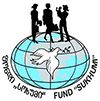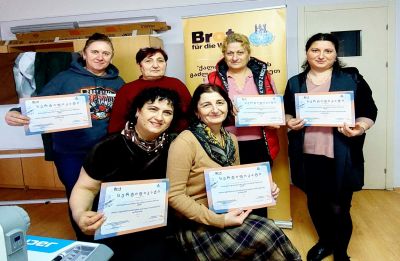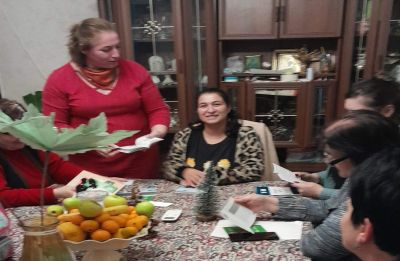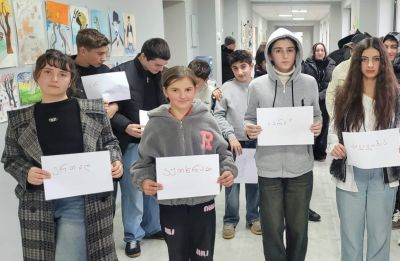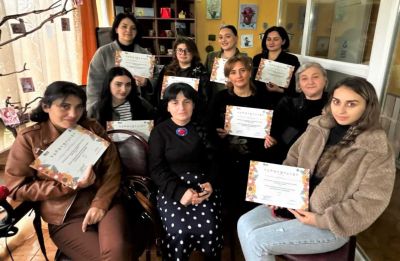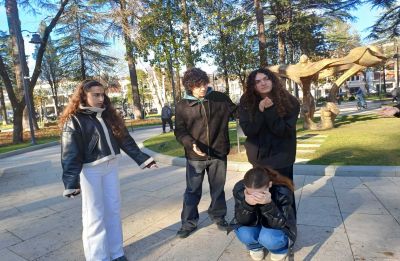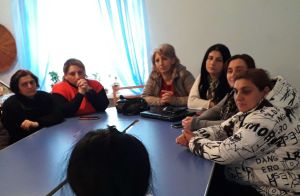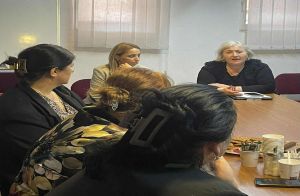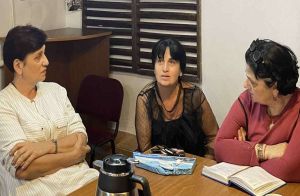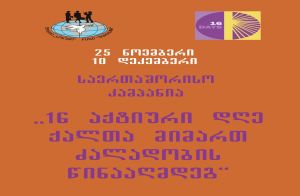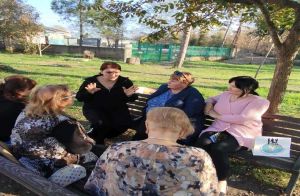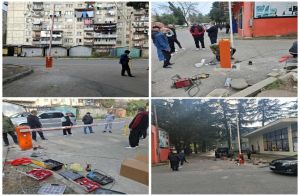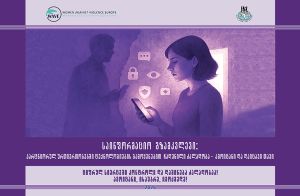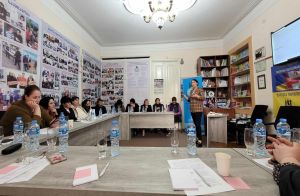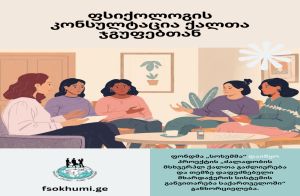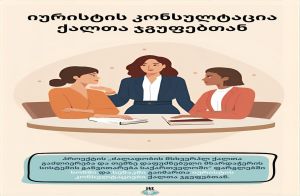Mobilization meetings of Women Support Centers covered new beneficiaries. Participants learned about the Fund “Sukhumi” website, "Digital Resource Center for Women Survivors of Violence." Information about women's economic empowerment programs and victim support services was of particular interest.
"Such useful information must be provided to all women, as they are interested in it. Therefore, information dissemination must continue," the beneficiaries noted.
In parallel with the information campaign, new families under the risk were identified through monitoring in the Women Support Centers of Senaki, Khobi, and Tsalenjikha. Based on the case studies, mobilizers and paraprofessionals will initially work closely with these families. Then a psychologist will continue the work to address the risks of conflict.
The project is implemented with the support of the organization Brot
für die Welt - Evangelischer Entwicklungsdienst (Germany)
The psychologist of the organization met with women's groups at the Women Support Centers of Khoni, Senaki, and Tskaltubo. The topic of the meetings was violence, and the goal was to inform participants about violence prevention and support mechanisms. Participants received individual and group consultation and discussed steps that can promote women's safety.
Further similar meetings are planned.
The project is implemented with the support of the organization Brot
für die Welt - Evangelischer Entwicklungsdienst (Germany)
Women's mutual assistance groups help each other, motivate, and strengthen each other. It's especially interesting when those gathered hear stories of successful women, and the psychologist encourages them to improve their self-esteem.
Kutaisi women's mutual assistance group had a successful guest. This happened at meetings in Tskaltubo and Terjola also. This provided great motivation for the group members.
Productive meetings were held in Khurcha and Kobuleti. Women discussed a variety of issues, including support for the Fund “Sukhumi”. In Terjola, our forum theater held performance for the group participants, and after the performances, a frank and emotional discussion was held.
Meetings were held in all groups in November. Each new meeting is proof that our organization is committed to empowering women living in the regions.
The project is implemented with the support the Equality Fund (Canada)
At women's mutual assistance group meetings, special attention was paid to our organization's website, "Digital Resource Center for Women Survivors of Violence," https://sosfsokhumi.ge/, which provides women with all the necessary information.
All participants were also provided with information about the "16 Day Campaign Against Gender-based Violence".
Participants asked numerous questions about the campaign, municipal programs, and assistance for socially vulnerable families, all of which received comprehensive answers.
All groups will actively participate in the 16-day campaign, as it is being carried out worldwide to support women like them.
The project is implemented with the support the Equality Fund (Canada)
The problem of apartment numeration in the IDP settlement of Poti was resolved – thanks to the active work of a mutual assistance group, 37 apartments were given numbers for the first time. Finding an apartment on Gagra and Abkhazia streets will now be easier.
A community survey revealed that the absence of numeration created a barrier – it was difficult to find the house when calling emergency services, that caused a health and safety risk.
In order to address this issue, 37 number boards were made, and the settlement was provided with all the necessary materials (fasteners, silicone, screwdrivers). Residents also actively participated in the installation process.
The IDP settlement had never received such support, and this initiative evoked particular gratitude and motivation in the community.
As part of civic initiative support, Poti mutual assistance group plans to gradually address other issues.
The project is implemented by a coalition of non-governmental organizations: the Association of IDP Women ”Consent”, the Women's Information Center and the Women's Charitable Humanitarian Found “Sukhumi”.
Kutaisi mutual assistance group identified a problem for the initiative as a result of a survey, which was subsequently confirmed at a community meeting.
The courtyard of the IDP settlement on Nikea Street has two entrances, and there are no gates on either side. Unknown cars were entering, and there was no safe space for children. Therefore, the community decided to install a barrier. The second need identified was cosmetic repairs of the entrance and ramps.
Implementation of the initiatives has already begun. The Women Fund “Sukhumi” is providing support, and settlement residents are volunteering by physical work.
Work has also begun in Choma settlement to develop civic initiatives for the solution of two problems.
The project is implemented by a coalition of non-governmental organizations: the Association of IDP Women “Consent”, the Women's Information Center, and the Women's Charitable Humanitarian Fund “Sukhumi”.
The brochure “Technology-Facilitated Violence in Intimate Relationships – Recognize and Protect Yourself” is a practical guide designed to help women and girls identify and respond to digital forms of abuse such as surveillance, control, and intimidation. It outlines the main types of technology-facilitated violence, legal protection mechanisms, and prevention tools—raising awareness and encouraging action: recognize, speak up, act!
The publication is prepared by the Charity-Humanitarian Women Fund "Sukhumi" with the support of the WAVE Network.
The project implemented with the support of the WAVE Network
Today, we took another important step toward strengthening women’s safety at the community level. Community women leaders and paraspecialists are the ones who notice the early signs of violence, hear women’s stories first, and support them in taking their very first steps toward safety. Their knowledge and capacity directly determine whether a woman in the community receives timely and adequate support. On 15 November, we held an intensive training: “Strengthening Community Leaders in Identifying, Referring, and Supporting Women Affected by Domestic Violence.” Throughout the day, we worked together on essential topics, including: the nature, forms, and indicators of domestic violence, referral mechanisms and effective coordination among key actors, practical case-based exercises, and, importantly, the use of the new Digital Resource Center as an information and support tool for women experiencing violence. Our goal is to strengthen an informed, sensitive, and well-coordinated community response system. This system ensures no woman is left alone, neither at the first sign of violence nor at any point afterwards. This training is part of a long-term process that the Women’s Fund “Sukhumi” has been building for years: creating safe, empowered, and violence-free environments for women, community by community. Together, we create spaces where women’s voices are always heard. Together, we make sure that violence is no longer invisible.
The project implemented with the support of the DANNER - Kvindecenterfonden Dannerhuset
The Women's Fund “Sukhumi” has launched the project “Empowerment of Women Survivors of Violence and Development of a Community-Based Support System in Georgia.” Within the project, a psychologist visited women’s groups in Khoni and provided consultations to the participants. The goals of the meeting were to reflect on the psycho-social impacts of violence, strengthen participants’ self-esteem. The psychologist discussed - factors contributing to domestic violence, its causes and consequences, and the social attitudes that often reduce empathy. Participants shared their personal experiences. The importance of group-based support was emphasized, as a process of restoring strength and reconnecting with oneself.
The project implemented with the support of the DANNER - Kvindecenterfonden Dannerhuset
Within the framework of the project “Empowerment of Women Victims of Violence and Development of Community-Based Support Systems in Georgia,” legal consultations were held for women’s groups in Senaki and Khoni. The main goals of the consultations were to introduce women to the existing mechanisms of legal protection, to explain what steps can be taken in cases of violence, and to clarify the responsibilities of the state and society in the response process. During the meeting, the lawyer discussed: protection mechanisms, procedures provided by law, and the responsibilities that arise in cases of violence. Participants reviewed various real-life cases and emphasized that legal awareness is an essential foundation for women’s safety and freedom of choice.
The project implemented with the support of the DANNER - Kvindecenterfonden Dannerhuset
